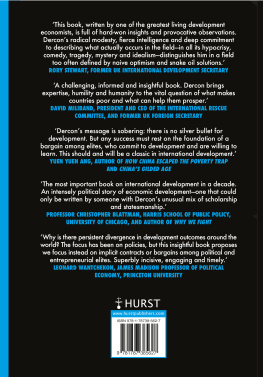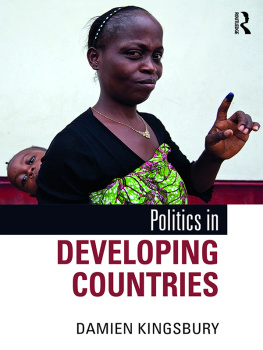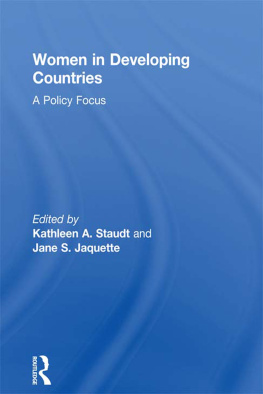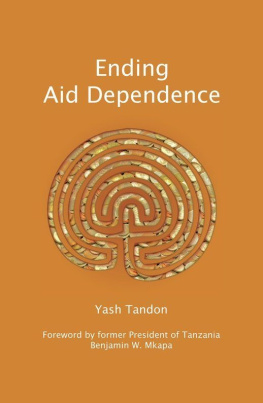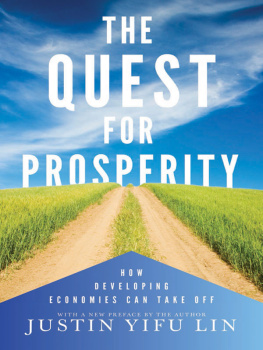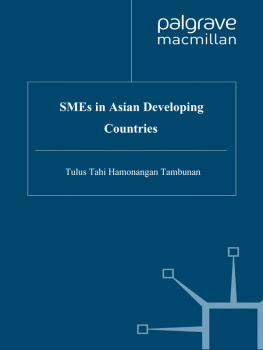Table of Contents

GAMBLING ON DEVELOPMENT
STEFAN DERCON
Gambling on
Development
Why Some Countries Win and
Others Lose

HURST & COMPANY, LONDON
First published in the United Kingdom in 2022 by
C. Hurst & Co. (Publishers) Ltd.,
New Wing, Somerset House, Strand, London, WC2R 1LA
Stefan Dercon, 2022
All rights reserved.
Distributed in the United States, Canada and Latin America by Oxford University Press, 198 Madison Avenue, New York, NY 10016, United States of America.
The right of Stefan Dercon to be identified as the author of this publication is asserted by him in accordance with the Copyright, Designs and Patents Act, 1988.
A Cataloguing-in-Publication data record for this book is available from the British Library.
ISBN: 9781787385627
www.hurstpublishers.com
CONTENTS
ACKNOWLEDGEMENTS
This was a book I had to write. Much of the material evolved over many years via numerous presentations to students, fellow academics, development experts, public servants or just interested listeners, and across four continents. Some of these talks excited listeners and encouraged me to work further on clarifying my thoughts. Others got me into trouble on Twitter, or they led to whispered warnings from peers that I was being disrespectful to senior academics. Years of encouragement by friends and colleagues persuaded me to write this book, nevertheless.
I could not have gone down this path without decades of absorbing the much more careful work of many of my academic colleagues in international development across the world. I hope I have not offended any. My colleagues and generations of students at the University of Oxford deserve an extra thank-you as I learned more from them than they learned from me.
My main thanks have to go all my colleagues at the Department for International Development (DFID), now defunct and submerged in the Foreign, Commonwealth and Development Office. Some senior officials at DFID (you know who you are) took a gamble on me when they first appointed me their chief economist in 2011. It was a life-changing experience, and I learned so much, among other things about the relative futility of much of my academic work, although fortunately not all research has to have immediate utility. Senior DFID staff freed me to roam across their department and the world. Their generosity allowed me to fully appreciate how central the interaction of economics and politics is in any country, including the UK. The decade that followed my first appointment was unique, and professionally I have never been happier than during that period.
Forgive me if I dont list at length all those I should, but that is simply out of fear that I would forget and therefore offend someone. But I would like to call out a few people, nevertheless. Ranil Dissanayake commented insightfully on the entire manuscript, and Sabra Ledent was an astounding content editor. And, not least, I hail my father, whose optimism was always infectious, although that other infectious scourge of our time, Covid-19, took him away while I was drafting the early chapters of this book. I dedicate this work to him for his undying support of whatever I chose to do.
PREFACE
A decade or so ago, I came to a realisation. I needed to radically rethink how development comes about. By then, I had one foot in academiaas an Oxford professorand one in governmentas a senior UK government official, serving as chief economist and the most senior technocrat in the UKs Department for International Development (DFID). My moment of truth came not long after I first flew into Beijing and then travelled around Chinathe farthest east I had ever ventured, despite having already visited forty-odd developing countries.
I never saw in China the extreme deprivation I had seen Burkina Faso, Ethiopia, or India in earlier years. Even if not precise, the statistics dont lie: in the 1980s China was the country with the largest number of people living in such deprivation. More than 700 million were subsisting on incomes and consumption levels that could reasonably be described as reflecting the most extreme forms of poverty. But by the time I was travelling around China, more than half a billion of Chinese had risen from those depths.
Half a billion is not a manufactured or a pie-in-the-sky statistic. Although the economic growth figures produced by China over the years goose-stepped in line with its development plans, the speed and scale of Chinese poverty reduction were never planned in the same way. However, the changes were clearly on view in carefully collected statistics and also on the ground. Most lives were not ones of affluence or leisure, but the China of ten years agoand todaywas definitely not a country in the grip of large-scale extreme poverty. Across much of Asia, this change is also under way. In some places, such as Singapore, the Republic of Korea, and Taiwan, the process started well before it began in China.
A lot has been written about what happened in China and how it came about. Some experts argue that China and other East Asian states serve as an examplea recipe evenof how to promote development. Fundamentally, say the experts, the steps that these countries followed are exactly what needs to be done: invest in growth as a state, preferably export-led growth, and encourage the emergence of a dynamic private sector to drive not only growth but also job creation. Meanwhile, also invest in health, education, and basic social protection. Policies that promote economic growth and development are key. Most important, these good policies could be introduced into other countries.
I admit that I quite happily bought into this perspective for a long timethat there is a clearly defined recipe for success, and refining and applying it to other countries are all that is required. The task of the academic is to improve this recipe using ever better evidence. When travelling in China, I realised that, no matter how successful it and other countries had been, no single policy recipe can be refined and spread around the world. And when Chinas progress took flight, China did not have a clear recipe either. Those in power took a gamble, committed to it, but did not know where it would end.
African dreams and reality
Studying what was happening in Chinaand, before that, in India, Vietnam, and Bangladeshwas energising. Even if India and Bangladesh did not follow the apparent Chinese recipe, their fast growth and subsequent decline in poverty demonstrated that change was possible. Not that these places were more interesting or fascinating than the African countries I had travelled and worked in earlier. I am an Africanist at heart, and I feel more at home in somewhere like Addis Ababa than in most parts of the world. But by the 1990s, I had seen too much stagnation and lack of change. The late 1980s and 1990s had at times been especially depressing for those of us working in and on Africa.
I was living in Tanzania when the Berlin Wall fell in 1991. However, Tanzania felt very far from Eastern Europes path towards economic and political change. The country was still in the grip of chaotic attempts to stabilise its economy, with empty shops and a flourishing black market in dollars, and still reeling from two decades of attempts to build the African version of the socialist-controlled economy in a one-party state. I spent my days quietly waiting for research interviews with government officials, who never turned up because they were barely paid and in any case felt little responsibility to do their jobs. They spent their days minding their own business, whether that was dealing in goats or in hard currency.

